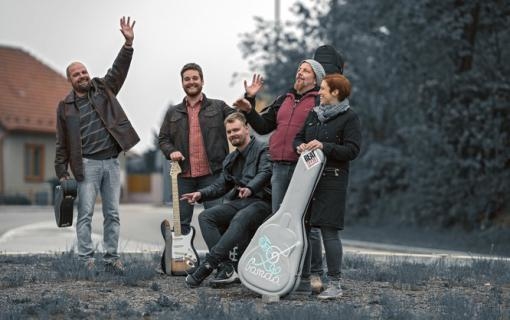Over the four years that divide the release of the first album Záhir, and the second one entitled O Písni [About the Song], Lee Band virtually moved on (previously they stated Adamov as their domicile, now it is Jedovnice), they got on a "wild card" to the Porta festival semifinals in Řevnice, and above all, they advanced slightly in their musical style. While the debut album was more about a folk-rock mainstream, benefiting from the sound of an electric guitar, the new album is dominated by acoustic guitars, often in combination with mandolin and other acoustic instruments.
On the contrary, the strong voice of Mija Peterková remains a certainty (she is also the author of most of the songs) and so does the repertoire, boasting very high quality within the genre, often with distinctive melodies (Než [Before], Vítr [Wind]), or with interesting arrangement (Za oknem [Behind the Window]). In addition to the aforementioned guitars and mandolin, the saxophone (Jiří Kuchař) plays an important role on the album, as well as the episode roles of the visiting accordionist Klára Veselá (who thus paid back the bandleader Peterková for her guest appearance on her album) or the trumpeter Tomáš Franc. And similarly as on the previous album, Michael Vašíček was also of great help, acting both as a music director and a sound engineer.
Already on the last album, Peterková, as a lyricist, successfully linked elements of epics, lyricism and more general ethical statements, and continues in this model on the new album as well. Songs such as Pár vět [A Few Phrases] or O Písni [About the Song] are more general, even if they contain some epic moments. You can find specific stories or their hints in songs such as Eleanor or Pavučina [Cobweb]. While in terms of content the lyrics are perfectly correct (although we have to accept the slightly proclamatory style of some of the songs), unfortunately, there are mistakes on the album: hyper-correct pronunciation of the auxiliary verb "jsem" (correct pronunciation is [sem]) and above all the erroneous declension of the pronoun "jenž/jež" in the song Probuzená [Awakened] (by the way, the version printed in the booklet is correct, but it differs from what really sounds in the recording). Phrasing fails in some places ("vítr co vlasy cuchá" [the wind that blows the hair] – with the accent placed on the last syllable), and regional (Moravian) pronunciation of the final consonant stands out elsewhere ("umříD je fér" [it is fair to die]).
On the other hand, we can appreciate the work with dynamics, which in this acoustic genre is not quite obvious (see the dramatically built song Než) and the ear- pleasing connection of the singer's voice with other instruments, for example in the song Vítr. These above-mentioned wind instruments then replace the absent electric guitar in instrumental solos. This is why Lee Banda's second album, perhaps predictable in some of its stories, is far from the gray folk mediocrity. Best moments? Za oknem, Vítr, Než, Pár vět and the eponymous O Písni.
CD Lee Banda – O Písni, self-published in 2018, 10 songs, Total playing time: 35:56
































No comment added yet..